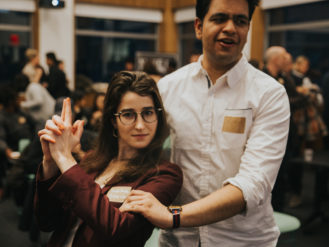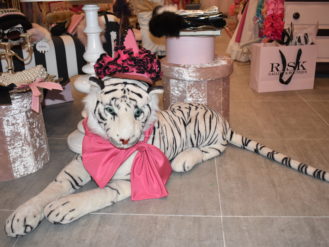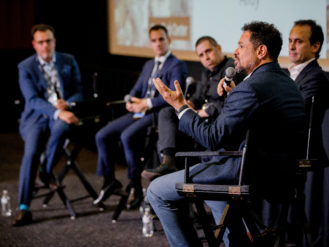If You’ve Got the Goods, They’ve Got a Store for You
Bulletin, from two Brooklyn founders, gives small companies a place to sell their wares in a shared space. Silicon Valley has bought in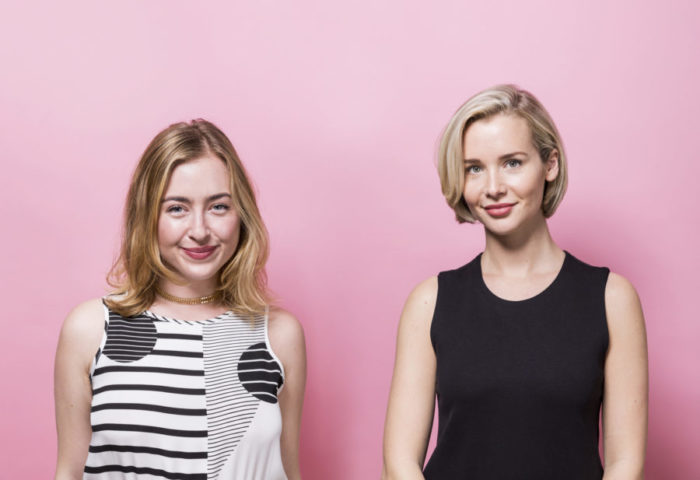
Bulletin co-founders Ali Kriegsman, left, the chief operating officer, and Alana Branston, the CEO (Photos by Seth Caplan/Courtesy of Bulletin)
When Bulletin Broads opened in the Williamsburg storefront at 145 Wythe Ave. earlier this year, it was described as “Brooklyn’s newest feminist store.” The well-designed, faux-fur-lined interior holds 40 different brands–products made for women, by women—ranging from graphic tees to artwork.
Bulletin’s co-founders Ali Kriegsman and Alana Branston came up with the concept as a direct response to the current political climate. But the Trump Administration isn’t the only thing these two Brooklyn-based women are taking on. Inspired by Brooklyn’s flea- and pop-up markets, Kriegsman and Branston are out to prove, both to the startup world and New York’s commercial real-estate industry, that innovative retail can be a good business, even as online shopping threatens to wipe it out.
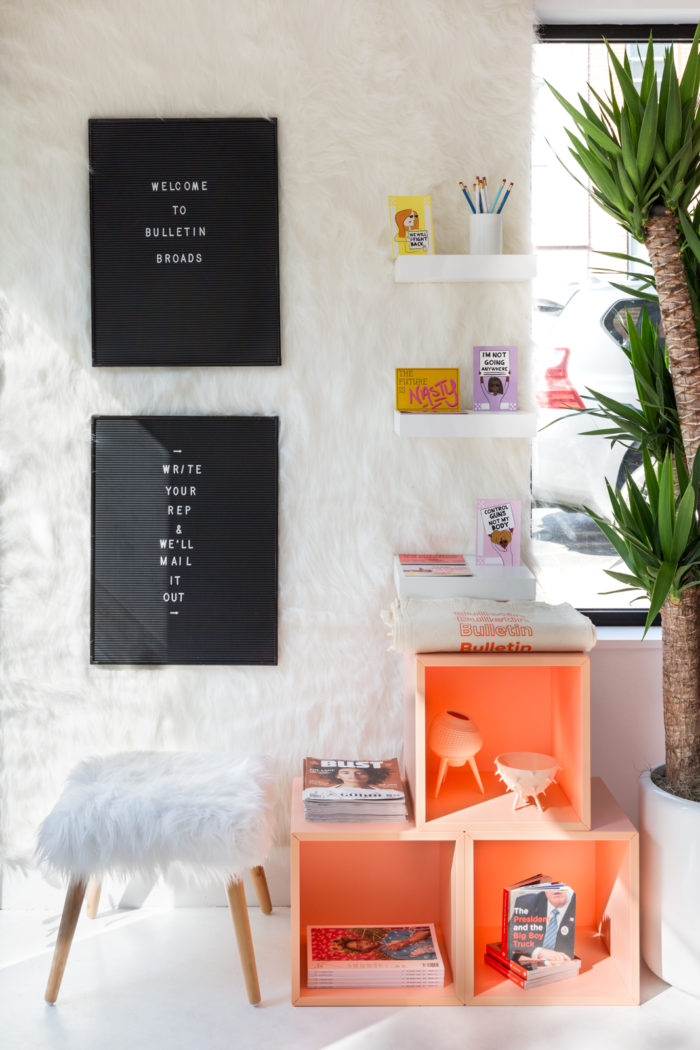
At the Williamsburg store, Bulletin Broads offers goods from multiple retailers, plus events like “Write Your Rep” every Tuesday
Bulletin envisions itself as the “WeWork of retail,” in which businesses, particularly online brands, could rent sections of a Bulletin store on a month-to-month basis. Within that space, vendors get to decide which products get sold, how they’re priced, and how they’re displayed. Revolving around a feminist theme lends to the “experiential retail” that provides an attractive alternative to online shopping.
The company expanded across the river in August, opening its second Bulletin Broads store, at 27 Prince St. in Manhattan’s Nolita neighborhood, and have set up a small headquarters nearby.
While they have a sharply focused business model now, Kriegsman doesn’t sugarcoat the tale of their journey to that place. Inside their Nolita office—a compact, one-bedroom apartment painted pink and filled with scented candles, shelf space and desk chairs—it’d be easy to paint a pretty picture of business success.
Kriegsman, sitting casually in the “bedroom” portion of the Bulletin office, explained that “it’s been an uphill battle from the beginning.” The company is investing in brick-and-mortar retail at a time when online shopping has threatened its very existence. They jumped into New York’s commercial real-estate market, not for the faint of heart, with no background in real estate. They partnered with vendors who have little to no experience selling in stores. And they’re building an unapologetically feminist brand within the tech industry, not always known for its friendliness toward women.
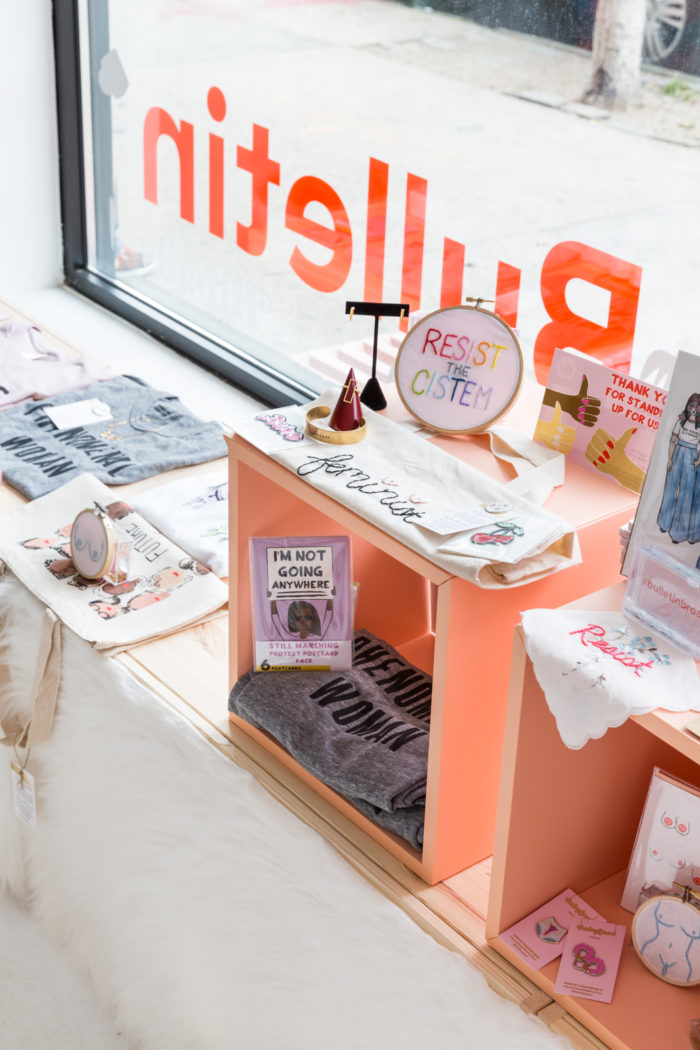
With their carefully curated collections, the founders are fine-tuning the concept of “experiential retailing”
The company began when Kriegsman and Branston were co-workers at Contently, a content-marketing firm, and decided to start a digital E-commerce magazine featuring unique handmade items. They applied to a Y Combinator fellowship on a whim, secured $20,000, and quit their jobs to pursue the magazine full time.
When it became clear the magazine wouldn’t lead to a viable business, the pair tested a pop-up model for vendors they had featured in the magazine. “[Vendors] were telling us that they didn’t need another online channel, they were looking for ways to make it easier to sell offline,” Kriegsman said. She and Branston saw that the markets proliferating through Brooklyn—like Brooklyn Flea and Artists & Fleas—were expensive to join and asked vendors for a significant commitment. “There wasn’t any way for a brand to say, ‘I want to sell my stuff this Saturday in Williamsburg and see what happens,’” she said.
And so the next iteration of the business took hold: an affordable, flexible and easy-to-join market that ran between April and October of 2016 in a Williamsburg parking lot. While a fun experience—and a way for Bulletin to further deepen its relationship with vendors—the events were physically demanding, weather dependent, and required vendors to show up in person.
That problem was solved as soon as Bulletin secured the lease at 145 Wythe Ave. and opened a brick-and-mortar store in May. With a physical space, Kriegsman and Branston could finally define their brand: a play off the popular co-working concept to provide space to primarily online retailers.
If a good business idea is one that provides the solution to a problem, Bulletin is tackling many of them at once. It’s providing affordable retail space as New York’s high commercial rents have become prohibitive for small businesses. It’s also supporting those vendors as they make the transition from the online marketplace to an actual store—with a sales split of 70% going back to the vendor.
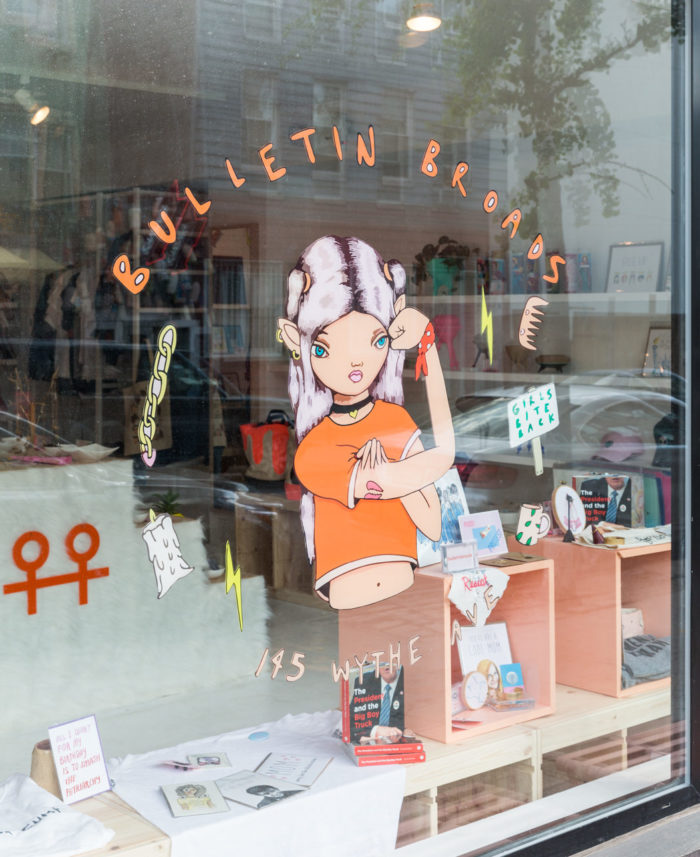
A message of female empowerment pervades the store
“It’s almost been like an incubator program for me,” said Caroline Mills, founder of the embroidery company Babyface Press. Mills started selling her feminist embroideries as a hobby through Etsy; she is now struggling to keep up with the demand after renting space in the Williamsburg store. Sarah Brown, of the jewelry company BITxBROWN, echoed the sentiment. “We’ve grown my brand together,” she said. “Bulletin really partners with its brands … this doesn’t feel like a typical wholesale relationship.”
Bulletin is also fine-tuning the concept of “experiential retail” as online shopping further threatens the traditional retail store. That requires carefully curating the merchandise. At the Williamsburg store, the current lineup features “cute T’s, pithy pins, pussy prints, feminist zines, shower caps, period products and more,” as the website says, curated carefully by the founders.
Events are part of the mix. Every Tuesday, the store hosts a “Write Your Rep” night, encouraging citizens to get in touch with their legislators, and thanking participants with a free rose. “We believe the internet has changed what a store is for,” Kriegsman said.
Their idea–and execution of it–has won attention from the tech industry. Bulletin announced in May that it raised $2.2 million in seed funding from investors including Silicon Valley powerhouse Kleiner Perkins. They plan to open two more stores in New York soon and one in Los Angeles next year.
“We will not take no for an answer,” Kriegsman said of their persistence in proving the sustainability of their concept to investors and real-estate agents. “We applied to an incubator program three times before getting in this year. We take a hard line negotiating our leases and our terms. I think, for us, we would love it if Bulletin’s success becomes synonymous with women changing the course of an entire industry.”
Their vendors are along for the ride. “There’s a really cool solidarity there,” Brown says. “Like, let’s work together–and let’s sell stuff together, too.”





